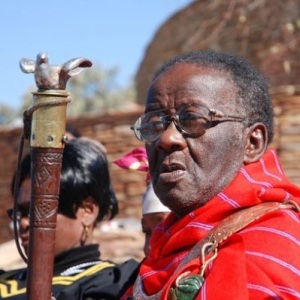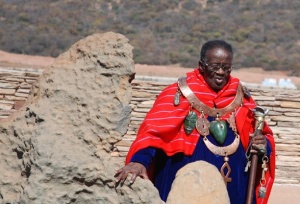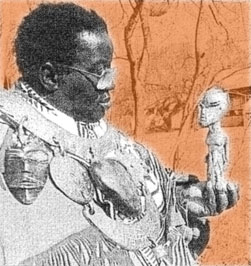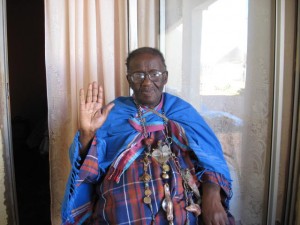
Vusamazulu Credo Mutwa was born 21 July 1921 in KwaZulu-Natal, South Africa. He is a Zulu Sangoma and Sanusi. He is also the author of several books. His father was a widower with three surviving children when he met his mother. His father was a former Catholic catechist from the Embo district near Inanda. His mother was the descendant of a long line of Zulu medicine-men and custodians of tribal lore and customs. His parents parted shortly after Vusamazulu’s birth, because his mother refused to convert to Christianity. He was subsequently raised by his father’s brother and was taken to the South Coast of Natal, near the northern bank of the Mkomazi River. He did not attend school until he was 14 years old. In 1928 Vusamazulu was taken to the Transvaal by his father. They lived on a farm near Potchefstroom, where his father was a labourer. After twenty years of different farms the father found employment in one of the Johannesburg mines as a carpenter. When he visited his mother and grandfather in Zululand after thirty years of absence, he renounced Christianity at their command, and underwent the ceremony of purification, in order to begin training as a medicine-man.

He also prepared himself to assume the post of custodian of tribal lore and customs in the event of his grandfather’s death. Mutwa has written African tales which have their roots in oral, traditional Zulu culture. Two well known collections of these stories are Indaba My Children and My People: writings of a Zulu Witchdoctor (1969). At the age of almost ninety, in May 2011 Credo Mutwa has had the latest in a series of strokes. He is very ill and has lost feeling in his left side, but is still making jokes and laughing as usual. Even in these circumstances he’s thinking of others and his message is that forgiveness and love are the only answer to the problems of South Africa and the wider world.

Here’s a short example of Credo Mutwa’s work, this is entitled “Bantu meanings for numbers African Folktales”, by Vusamazulu Credo Mutwa.
1. Kunye ‘It is one’.
The Bantu regard the number One as the holiest of all. It represents the combining of all created things – the Oneness or the Whole, which is God. It is an absolute number and it has no rival. It is also the symbol of freedom – thus the salute with only the thumb projecting from a closed fist.
2. Kubili- ‘It is two’.
This is a very evil number – the symbol of imperfection. It requires two to produce offspring. It represents dissension and diversity of opinion, or disunity.
3. Kutatu – ‘It is three’.
This is third in holiness to number One; it represents completeness, a number that cannot be split in two. Two wives can quarrel, but a third can settle the dispute. A man can quarrel with his wife but a ‘third party’, or a second wife, can intervene and restore order. Thus the Bantu’s strong belief in polygamy. Three gives that ‘casting vote’ to ensure a decision or enforce peace.
4. Kune- ‘It is perfection’.
More literally, this word means ‘It is firmly together’. This number symbolises strong and harmonious unity by powerful people working together for a common cause. If one chief should send four sticks closely tied together to a neighbouring chief, the message portrayed would be: ‘Let us unite’.
5. Kuhlanu – ‘It is perfection ruined’.
This is another evil number; it symbolises the fallibility of Man. Man is as imperfect as the five fingers of his hand or the five toes on his foot – one is out of place, or of different shape.
6. Isithupa – ‘It is the thumb’.
This number represents strength and it symbolises the six component parts that constitute the human being: the soul, the Etta, the body, the mind, the Living Force and the Adverse Force. The Living Force, or Life, is the Spirit of God, and is constantly opposed by the Spirit of Evil; the one generates Life, the other promotes Death.
7. Isikombisa – ‘It is the pointed finger’.
This is the ‘idiot number’, or the number of failure. It symbolises the futility in Man’s habit of persisting in doing or constructing things that are afterwards swept away by the River Time. I t symbolises those who rise to fame only to fall so much harder.
8. Isishiyagalombili — ‘It is bend two fingers’.
This number is associated with genetic weaknesses, frigidity, war and death in a vile form.
9. Isishiyagalolunge- ‘It is bend one finger’.
Another holy number symbolising creation. The Bantu believed that the soul was connected with the brain through nine large veins. Because of the nine months of pregnancy, this is regarded as the ‘female’s number’. If nine beads should feature in a woman’s dream it is a sure sign of pregnancy. When she dreams of stringing nine red beads she will give birth to a boy, while white beads foreshadow a girl. Copper beads predict a miscarriage.
10. Ishumi— ‘It is completion’.
Another holy number and closely related to One. It is believed that there are ten gateways to the Spirit Land and that God is tenfold in the nature of His Being. This number is, therefore, of deep religious significance.
11. Ishumi Na Nye- ‘It is ten and one’.
A very evil number; the number of demons and all manner of evil. The ancient Bantu considered it as so evil that it was never mentioned aloud; when they had to indicate this number they spoke instead of ‘the second ten’. A father often sent the eleventh child with its mother away from him, for the child to be reared elsewhere.
12. Ishumi Na Mbili — ‘It is ten and two’.
A rather good number. It symbolises the growing plant and is therefore also a symbol of fertility.
13. Ishumi Na Ntatu- ‘It is ten and three’.
A combination of completeness and perfection — second in holiness only to the number One. It symbolises perfect harmony between a husband and his wives or between a chief and his subjects, the kind of perfection that is materially experienced through sexual intercourse. A humorous legend tells of a Bapedi Queen who declared herself willing to marry a man only on condition that he undertook to please her thirteen times every night. She eventually found such a man – none other than the earthly Lost Immortal, Lumukanda, who met her demands so amply that she fled from the kraal and spent the rest of the night up a tree.









No comments:
Post a Comment